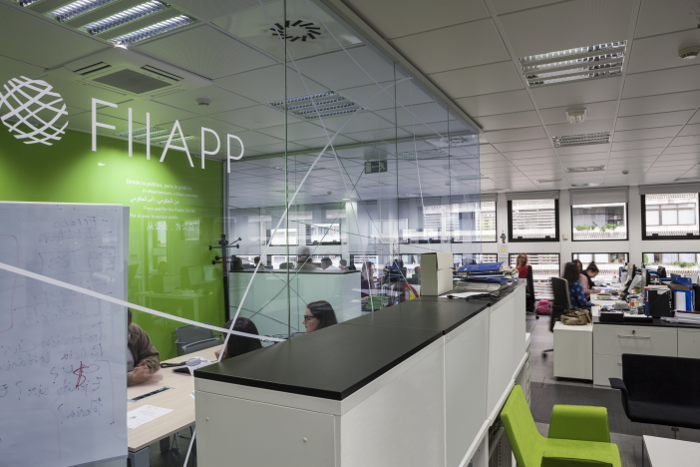-
11 March 2016
Category : Reportage
Four skills for working in cooperation
Working in cooperation is an increasingly sought-after career path. Proactiveness, conflict resolution, flexibility, and empathy are some of the qualities needed.
 FIIAPP offices in Madrid
FIIAPP offices in MadridFor a good part of the population, the cooperation sector in Spain is totally unknown, and even more so the area of public cooperation, which is the focus of the work of the International and Ibero-American Foundation for Administration and Public Policies (FIIAPP). It is a highly specialised field in which all types of professionals can find a place.
In constant flux, the job market in cooperation should not be overlooked by job-seekers, as each week, through different employment websites, numerous institutions, foundations, and international cooperation organisations post new vacancies. Technical specialists, managers, economists, engineers, and political scientists are some of the profiles in demand.
What can I do to get a job with FIIAPP?
Public cooperation is a branch of cooperation dedicated to strengthening public institutions between countries. This is the sector in which FIIAPP has been working since 1997, hiring new employees every year.
That’s why it is important to know what types of professionals the foundation looks for. Ana María Serrano, Director of the Human Resources and Organisational Area of FIIAPP, explains that the most in-demand profile at the foundation is a “person with a university degree, normally in a social field, with a specialisation in cooperation and experience in project management. Other important merits are management skills and knowledge of European Union projects. In addition, languages are important. Fluency in English is practically a basic requirement, and French and Portuguese are always welcome.”
In terms of the most highly-valued qualities in a FIIAPP employee, Ana María Serrano emphasises “the ability to work on a team, resolve conflicts, and manage and coordinate people. Communication is also important, as the people who manage projects are in constant communication with both partners and experts.” In addition, she adds that proactiveness is very important, “it’s always good to find a person who is constantly curious and interested in seeking knowledge and possibilities. Empathy, proactiveness, and flexibility are also very highly valued qualities”.
Step 1: How do I apply?
Once you have located an interesting vacancy, you need to take time to prepare your candidacy with care to avoid missing out on opportunities. According to Ana María Serrano, when a person has decided to seek employment in cooperation, there are a several points to understand clearly:
– Look at the section of the FIIAPP website where job vacancies are posted every 10 or 15 days. This is the period of time allowed for submitting applications. That way you won’t miss any opportunities.
– Don’t send a standard CV. It’s advisable to adapt your CV to the position, address all of the points in the job announcement, and spend some time on it to improve your chances. Ana María Serrano explains that “if not, you run the risk of being eliminated in the initial screening because the recruiters don’t have all the information”.
Step 2: What is the selection process like?
To be selected, it’s not enough to send in your CV on time. A job applicant must pass through a selection process that normally has three parts:
– A part that is fundamentally objective to assess whether the applicant meets the position requirements and has the desired qualities.
-Testing related to the duties of the position.
– A personal interview.
The FIIAPP Director of Human Resources explains that “in part of the interview we place a high value on the capacity shown by the person to perform the duties of the position, interest in and knowledge about the project, and about the institution and the type of institution it is”.
Lastly, she adds “I recommend that the person seeking to take part in a selection process visit our website, soak up everything on it, about what we do and the project related to the vacancy. When preparing for the interview, you have to show who you are. Be yourself and demonstrate that you are truly interested in the position and knowledgeable about the world in which you will be working.”
The views and opinions expressed in this blog are the sole responsibility of the person who write them.




